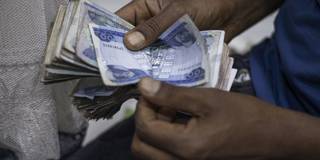When development policymakers convene next week at the Spring Meetings of the World Bank and the International Monetary Fund, they must pursue ambitious reforms of the global financial architecture. Otherwise, African countries will continue to be treated as less equal, condemning them to default-driven borrowing costs.
CAMBRIDGE – “All animals are equal, but some animals are more equal than others,” George Orwell famously wrote in Animal Farm, his allegory of Stalinism. But Orwell’s maxim could just as easily apply to the sovereign-debt crisis in Africa. Low-income African countries have the smallest share of global public debt but are more likely to be in debt distress or at high risk of it.
This paradox reflects a dysfunctional international financial system. Unlike advanced economies, which have highly developed local-currency bond markets, African countries are subject to prohibitively high interest rates and often cannot borrow from international investors in their own currency (the “original sin” of sovereign-debt markets). Instead, over 80% of African countries’ external debt is denominated in dollars or euros, which heightens their vulnerability to monetary-policy changes by a handful of systemically important central banks – and thus to a “debt doom loop” that only exacerbates their debt burdens.
Unless the policymakers convening next week for the annual Spring Meetings of the World Bank and the International Monetary Fund pursue reforms that address the inequities in the global financial system, a few privileged countries will continue to be more equal than others. Inaction would have negative consequences for macroeconomic stability, debt sustainability, global growth, and income convergence, and could undermine the World Bank’s institutional credibility as it embarks on a new mission “to end extreme poverty and boost shared prosperity on a livable planet.”

CAMBRIDGE – “All animals are equal, but some animals are more equal than others,” George Orwell famously wrote in Animal Farm, his allegory of Stalinism. But Orwell’s maxim could just as easily apply to the sovereign-debt crisis in Africa. Low-income African countries have the smallest share of global public debt but are more likely to be in debt distress or at high risk of it.
This paradox reflects a dysfunctional international financial system. Unlike advanced economies, which have highly developed local-currency bond markets, African countries are subject to prohibitively high interest rates and often cannot borrow from international investors in their own currency (the “original sin” of sovereign-debt markets). Instead, over 80% of African countries’ external debt is denominated in dollars or euros, which heightens their vulnerability to monetary-policy changes by a handful of systemically important central banks – and thus to a “debt doom loop” that only exacerbates their debt burdens.
Unless the policymakers convening next week for the annual Spring Meetings of the World Bank and the International Monetary Fund pursue reforms that address the inequities in the global financial system, a few privileged countries will continue to be more equal than others. Inaction would have negative consequences for macroeconomic stability, debt sustainability, global growth, and income convergence, and could undermine the World Bank’s institutional credibility as it embarks on a new mission “to end extreme poverty and boost shared prosperity on a livable planet.”